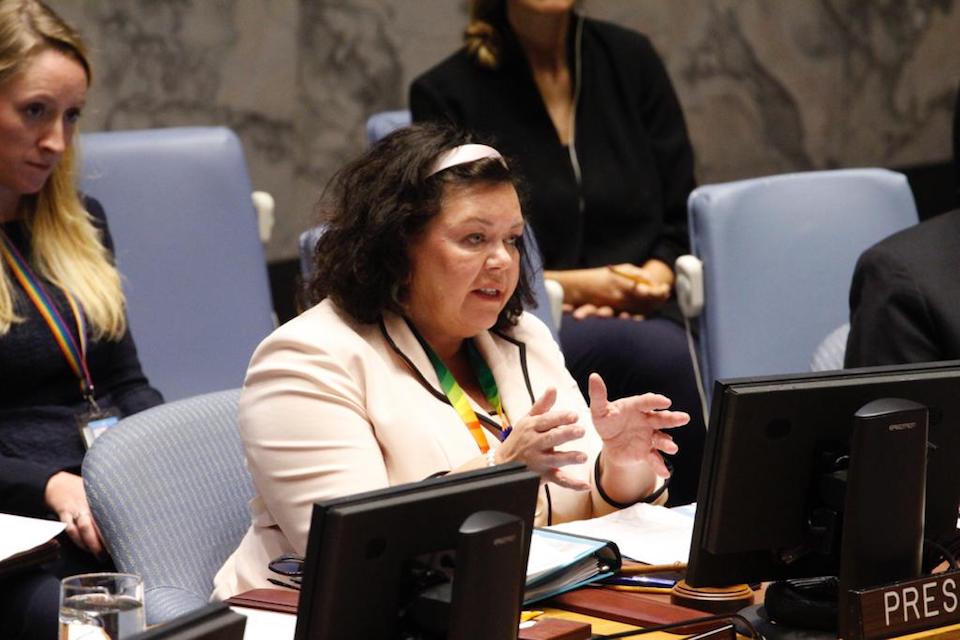Securing justice and maintaining peace for Bosnian citizens
Statement by Ambassador Karen Pierce, UK Permanent Representative to the UN, at the Security Council briefing on Bosnia and Herzegovina

Thank you, High Representative. Thank you to Ms Korjenic for your briefings.
I think we take a different view on the importance of the office of the High Representative than the Russian representative has just set out. We believe that the Office of the High Representative continues to play an essential role in Bosnia and Herzegovina and has the United Kingdom’s full support, including, as other countries have mentioned round the table, for the use of the Bonn powers if and when the situation requires. And the reason for that, I think, is obvious. There are some people, including some leaders in Bosnia and Herzegovina, who want to do all they can to stop Bosnia and Herzegovina being a flourishing, normal state. Dayton requires Bosnia to be an independent state with two entities, the Federation and Republika Srpska. But it does not place the entities above the state and therefore, as long as there are leaders in Bosnia who refuse to acknowledge or who work against that very important statehood aspect of Bosnia and Herzegovina enshrined in Dayton, codified by this Council and implemented for very many years through the Peace Implementation Council and the steering board, as long as that antagonistic approach to Bosnia as a state continues, the Office of the High Representative will continue to be necessary and the Bonn powers will continue to be necessary. So I just want to put on record the United Kingdom’s very firm support for you, High Representative, and your team.
I also want to thank Ms Korjenic from Trial International. We in the UK support Trial’s work to secure justice for survivors of conflict-related sexual violence and we pay tribute to all the work you do – and I’ll come back to that in a minute, if I may. And we join other colleagues in welcoming the unanimous adoption of the resolution for a further 12 months, authorising the European Union to continue Operation Althea. This demonstrates the continued commitment of the international community to Bosnia’s security and stability, but as the French representative said, it also underscores Bosnia’s European and Euro-Atlantic direction and trajectory.
And I just want to say on that that it is my understanding that there are certain laws in Bosnia and Herzegovina that codify this Euro-Atlantic integration, both in respect of the European Union and in respect of NATO, and there are certainly resolutions of this council that codify the Euro-Atlantic integration and there are numerous decisions by the Peace Implementation Council and by the steering board, which codify that Euro-Atlantic integration. And that desire of the Bosnian people has never been overturned in law. So while leaders may argue against that because they’ve changed their mind or it doesn’t suit their political rhetoric, the law of Bosnia and Herzegovina and the corpus of decisions supported and passed by the international community is in favour of supporting Bosnia for as long as she wants to go down that road of Euro-Atlantic integration. And these are battles that need to be fought democratically, not undemocratically through polemic and demagoguery.
I want to just recall that nearly 30 years ago, Bosnia and Herzegovina was the big issue for this council, where our predecessors passed many resolutions day after day to try and stop the fighting and restore stability and peace to the country. The war lasted for four dreadful years and it changed forever the way the UN does peacekeeping. In 1995, as we’ve heard today, the massacre in Srebrenica claimed nine thousand lives of Muslim men and boys - the worst massacre in Europe since 1945. These are not insignificant events for Europe or for Bosnia or for the Balkans. And the reason the International Criminal Tribunal was set up was indeed to try people for these crimes. So we very much agree with Ms Korjenic that people should not be trying to undermine what the ICTY discovered. The ICTY was a legitimate tribunal. It was established by this Council and its judgments still stand.
I’m running out of time so I will simply say that on reconciliation, I endorse what the German and Indonesian representatives said. That’s a very important part of what is happening. And I also want to stress the vital importance of the rule of law for all Bosnia and Herzegovina citizens. Ms Korjenic exhorted us not to despair. I don’t give up on Bosnia. I’ve worked on the issue of the Balkans since 1991. We’re not going to despair because if we despair of Bosnia, it fundamentally means the bad guys have won. And that’s not what we’re going to let happen. So you can rely on the United Kingdom and your Atlantic institutions to remain helping Bosnia as long as all of Bosnia’s citizens want it.
Thank you very much.